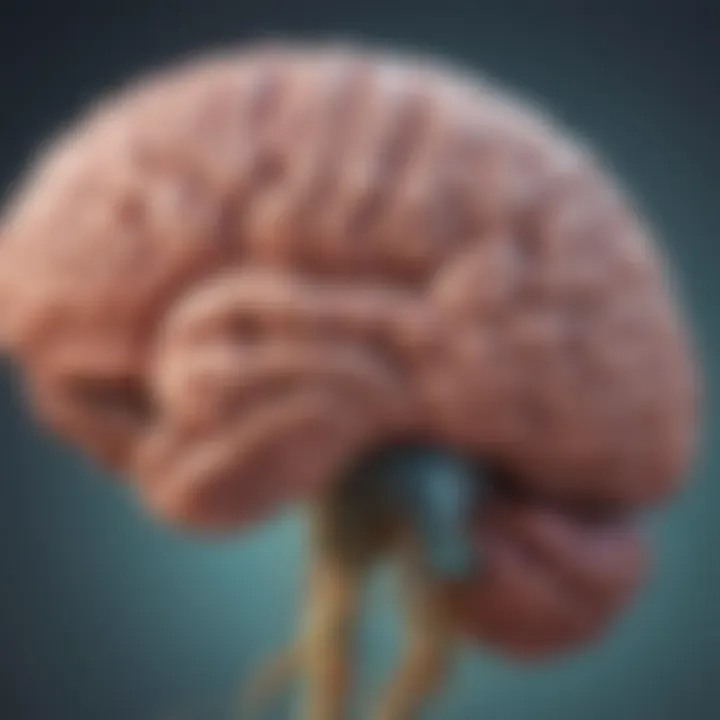Understanding Brain Food: Insights from Dr. Lisa Mosconi


Intro
In an age where the hustle and bustle of daily life often overshadows essential self-care practices, the dialogue surrounding nutrition's role in brain health has become increasingly pertinent. This article seeks to synthesize the insights provided by Dr. Lisa Mosconi, an acclaimed neuroscientist and nutritionist, who posits that food isn't merely sustenance; it is a fundamental building block for our brain’s health. As we explore the nuances of 'brain food', it’s clear that the choices we make on our plates can reverberate into our cognitive functions, affecting memory, clarity, and overall mental agility.
Dr. Mosconi's work intersects the fields of neuroscience and nutrition, spotlighting how specific dietary components can either enhance or deteriorate cognitive performance. This article will dissect these intersections, illuminating the significant impact of what we consume on our brain’s vitality.
Moreover, we will delve into practical applications of these findings. With thousands of food options at our fingertips, understanding which ones nourish our brains—and why—can empower readers to make informed decisions that benefit their mental faculties. The aim of this exploration is not just to inform but also to inspire a shift in dietary habits, promoting habits that foster cognitive resilience.
Each section will draw from Dr. Mosconi's extensive research, making connections between food, cognitive science, and actionable insights.
Book Categories
While Dr. Mosconi��’s work intrinsically revolves around health and nutrition, it spans categories that resonate with essential life themes:
- Self-Help and Personal Development: Her insights provide tools for individuals aiming to enhance cognitive function as part of their overall personal growth strategies. Optimal brain health forms the bedrock of success and productivity in various facets of life, from professional to personal achievements.
- Science and Health: This category encapsulates the scientific underpinnings of her research, offering a window into how external factors—in this case, diet—can influence brain function at a cellular level.
Key Insights and Takeaways
Throughout this article, several pivotal points will emerge from Dr. Mosconi’s expertise:
- The Brain-Body Connection: Understanding that our brain requires specific nutrients to function optimally. Diet impacts cognition just as exercise enhances physical well-being.
- Key Nutrients for Brain Health:
- Omega-3 fatty acids: Found in oily fish like salmon, these play a crucial role in brain cell structure and function.
- Antioxidants: Present in colorful fruits and vegetables, antioxidants help combat oxidative stress that can impair cognitive performance.
- B vitamins: Essential for energy production and neurotransmitter synthesis, B vitamins are found in whole grains and leafy greens.
"What we eat can entirely redefine the way our brain functions over time. It’s an ongoing conversation, one meal at a time." — Dr. Lisa Mosconi
How to Apply the Lessons
Implementing the insights gleaned from Dr. Mosconi's findings requires actionable steps. Here are several practical tips to enhance brain health through diet:
- Incorporate More Whole Foods: Prioritize whole, unprocessed foods in your meals—think fruits, vegetables, nuts, and seeds.
- Hydration is Key: Water aids in maintaining optimal brain function; make sure to drink enough throughout the day.
- Limit Sugar and Processed Foods: High sugar and highly processed foods not only contribute to mental fog but also impact long-term cognition.
- Diversify Your Diet: Eating a varied diet ensures a broad intake of nutrients, which is beneficial for brain health.
By cultivating these habits, individuals can not only nourish their brains but also create a strong foundation for sustained cognitive well-being.
Understanding Brain Food
Understanding how food impacts our brain is not just some trendy health topic. It’s a fundamental aspect of our well-being and cognitive function. Neuroscience and nutrition are intertwined, and this intersection offers vital insights about the food that fuels our brains. Choosing the right nutrients can significantly influence how we think, learn, and even cope with stress.
When we talk about brain food, we are essentially discussing what nutrients support optimal brain function. This involves recognizing key vitamins, minerals, and compounds in foods that play a crucial role in maintaining brain health over the long haul. The moment we realize that our dietary choices can directly influence cognitive performance, the concept of brain food begins to resonate deeply.
Moreover, understanding brain food extends beyond merely making dietary adjustments. It involves embracing a holistic view of health. Considerations surrounding mental and emotional well-being come into play here, leading to a more comprehensive approach to how we nourish our bodies and minds.
Definition and Importance
At its core, brain food refers to food that has positive impacts on brain health, particularly concerning memory, cognition, and overall mental well-being. This is not merely about avoiding certain food types or magnifying just a few health benefits; it encompasses a range of nutrients that augment our brain's structure and function. In essence, what we consume plays a massive role in how effectively our brains operate.
Why is this important? The significance of understanding brain food lies in the life-long benefits it holds. Regular consumption of brain-enhancing foods could lead to improved memory and learning capabilities, increased focus, and reduced risks of neurodegenerative diseases later in life. Not to mention the immediate effects, like more energy and better mood, which can lead to enhanced productivity in daily tasks.
Historical Context of Brain Nutrition
The journey of understanding brain nutrition isn’t as new as one might think. Ancient cultures have long believed that diet influences mental capacities. For instance, the Mediterranean diet, rich in fruits, vegetables, whole grains, and healthy fats, has been linked to lower rates of cognitive decline in modern studies. Similarly, certain traditional practices showcased the use of walnuts and fish for maintaining mental sharpness.
In recent decades, scientific inquiry into the nutritional neuroscience field has exploded, drilling deeper into how specific dietary elements can foster cognitive longevity. Researchers have documented the efficacy of omega-3 fatty acids found in fish and the antioxidant properties of berries, reinforcing age-old beliefs with modern science. This fusion of historical dietary practices with contemporary research provides us with a well-rounded understanding of what brain food truly means today.
Through the lens of history, it becomes clear that our ancestors may have stumbled upon something significant long before we derived the science to explain it. Now, armed with centuries of wisdom and years of rigorous scientific study, we stand at a crucial juncture to optimize our intake for improved mental vitality.
Dr. Lisa Mosconi: A Brief Background
Understanding Dr. Lisa Mosconi’s background is crucial to appreciating the lens through which she views brain health and nutrition. Her insights blend academic rigor with practical applicability, making her a leading voice in the field. Mosconi’s exploration into the relationship between diet and cognitive function extends beyond mere theory; it's grounded in years of research and clinical observation. The significance of her work cannot be overstated—she emphasizes diet as a cornerstone of brain health, shedding light on how dietary choices can prevent neurological decline.
Academic Credentials and Research Focus
Dr. Lisa Mosconi holds a Ph.D. in Neuroscience, supplemented by a Master’s degree in Nutrition. These academic credentials situate her at the intersection of brain science and nutritional studies. Her research primarily focuses on how specific dietary patterns influence brain health over time. What makes her stand out in the crowded field of neurobiology and nutrition is her commitment to making scientific findings accessible to the public. Mosconi has undertaken extensive studies on how lifestyle choices, particularly regarding diet, affect cognitive function, making this the crux of her research agenda.
Beyond her degrees, Mosconi leads a laboratory dedicated to uncovering the connections between nutrition and cognitive health. She studies how nutrients impact brain structure and function, specifically looking at long-term effects, which is an often overlooked aspect of the discourse on brain food. Her work's relevancy is not limited to academia; it extends to clinical practices where her findings offer valuable guidelines for enhancing cognitive longevity through dietary interventions.
Notable Publications and Contributions
Dr. Mosconi has penned several influential works that reflect her commitment to unraveling the intricacies of brain nutrition. Her books, such as "Brain Food: The Surprising Science of Eating for Cognitive Power," provide practical advice drawn from extensive research and clinical experiences. These publications are not just academic contributions; they are also hands-on guides that demystify the connection between diet and brain performance for the everyday reader.


Moreover, Mosconi’s peer-reviewed articles contribute significantly to journals focused on neuroscience and nutrition, bridging the gap between research and practical advice.
"The empowerment of individuals through knowledge of nutrition and its impact on cognitive function is a primary mission of my research," Dr. Mosconi often states, encapsulating her philosophy.
Through her work, she cultivates a greater awareness of how dietary choices affect not just our present cognitive capabilities, but also long-term brain health. Thus, Mosconi's contributions extend beyond mere information delivery; they inspire actionable change in dietary habits.
In summary, understanding Dr. Lisa Mosconi's academic background and her contributions provides a vital context for exploring brain food. Her research and publications prompt a reevaluation of how nutrition can serve as a tool for cognitive enhancement. Readers find their understanding deepened, not just about what to eat but why those choices matter for their brains.
The Science Behind Brain Food
Understanding the science behind brain food is crucial in appreciating how nutrition affects our cognitive abilities and overall brain health. Nutritional neuroscience investigates how what we eat impacts our brain functions, emotions, and behavior. The intricate connections between diet and brain performance show that specific nutrients can enhance mental clarity, memory retention, and even mood regulation. In this section, we will explore the nuances of these connections and their significance for both individual and public health.
Nutritional Neuroscience Explained
Nutritional neuroscience is like a crossroads between biology and diet, where researchers delve into how nutrients affect brain activity. This field not only looks at the individual effects of vitamins and minerals but also studies how various dietary patterns influence cognitive health. For example, a diet rich in antioxidants can help fend off oxidative stress, which often contributes to neurodegenerative diseases. Similarly, understanding how omega-3 fatty acids function at a cellular level can provide insight into their protective roles in brain health.
The implications of this research are profound. It underscores the importance of a balanced diet, showing us that our everyday food choices can either bolster or undermine our cognitive functions. Thus, exploring nutritional neuroscience reveals why it’s imperative to equip ourselves with knowledge about our dietary habits to support a vibrant mind.
Brain-Boosting Compounds
Brain-boosting compounds refer to specific nutrients that significantly promote cognitive health. In this article, we will highlight three important categories: antioxidants, omega-3 fatty acids, and vitamins and minerals.
Antioxidants
Antioxidants play a vital role in protecting our brains from damage caused by free radicals. These unstable molecules can permeate our cells, causing a cascade of oxidative stress that leads to degradation of neural tissues. Berries, particularly blueberries, are a popular source of these compounds and are often highlighted for their positive effects on memory and overall brain health.
One notable characteristic of antioxidants is their ability to potentially reduce inflammation in the brain. This anti-inflammatory property makes them an attractive option for maintaining cognitive functions as we age. However, while many people praise their benefits, it’s worth noting that over-reliance on supplements instead of whole foods can lead to imbalanced nutrient intake.
"A balanced approach to nutrition often trumps isolated supplements when it comes to brain health."
Omega-3 Fatty Acids
Omega-3 fatty acids are renowned for their myriad benefits, particularly for brain function. Found abundantly in fatty fish like salmon and in flaxseeds, they are known to play a crucial role in maintaining cell membrane integrity and supporting neuronal growth.
A distinguishing feature of omega-3s is their contribution to neurogenesis, the process of forming new neurons, which is essential for learning and memory. Their anti-inflammatory properties also help mitigate depression and anxiety, making them a strong choice for promoting mental well-being. Nonetheless, the challenge lies in obtaining sufficient amounts in our diets, as many people don't consume enough fish regularly.
Vitamins and Minerals
Vitamins and minerals might seem elementary, but they are essential players in the realm of brain health. B vitamins, for instance, are critical for energy production in the brain and neural communication. Folate, a B vitamin, has been linked to improved cognitive functions and emotional stability.
The unique feature of vitamins and minerals is their synergistic effect, which means they often work better together than in isolation. This interconnectedness illustrates why a diet filled with diverse, nutrient-rich foods can offer superior benefits compared to relying on any singular nutrient. Nevertheless, the modern diet often lacks these essential vitamins and minerals, especially in processed foods laden with empty calories.
By diving into the depths of these brain-boosting compounds, we can better appreciate how specific dietary choices empower us to take charge of our brain health. From antioxidants to omega-3 fatty acids and essential vitamins and minerals, each component plays a distinct role in nourishing our minds and enhancing cognitive functions.
Key Food Groups for Cognitive Enhancement
Understanding how what we eat influences our brain health is crucial in today’s fast-paced world. Cognitive enhancement is not simply the result of taking supplements or medicines. Instead, it often comes down to incorporating key food groups routinely into our diets. These groups provide essential nutrients that subsequently nurture our brain function, affecting everything from memory to decision-making.
Many of these foods offer a treasure trove of beneficial compounds. Each food group plays a distinct role in promoting brain health, not just in the short term but also long-term. This section will dive deeper into the specific food groups recognized for their positive impact on cognitive performance, highlighting their unique contributions and benefits.
Fruits and Vegetables
Fruits and vegetables are widely celebrated for their health benefits, and when it comes to brain health, they are particularly noteworthy. They are packed with antioxidants, vitamins, and minerals that help protect the brain from oxidative stress and inflammation.
Blueberries
Blueberries, often dubbed a superfood, shine because they are high in antioxidants, specifically flavonoids. These compounds have been shown to enhance communication between neurons, ultimately improving memory and cognitive function. Researchers have made interesting connections between blueberry consumption and improved learning capacity.
The great thing about blueberries is their versatility; you can toss them into your morning smoothie, sprinkle them on a bowl of yogurt, or snack on them as is. Their sweetness makes them a tasty treat without the guilt. However, one should be careful with portion control, as moderation can still be key even with health foods.
"Blueberries are not only delicious; they represent a smart way to elevate your snack game and brain game simultaneously."
Leafy Greens
Leafy greens like kale and spinach are champions in the brain food category. They are rich in nutrients like vitamin K, lutein, and beta carotene, which are known for their neuroprotective effects. Eating these greens regularly can help slow cognitive decline as we age.
The unique aspect of leafy greens is their ability to provide a wide range of nutrients in few calories, making them a stealthy addition to any meal. They can be easily incorporated into salads, smoothies, or even soups. One minor drawback is their sometimes bitter taste, which could deter some from enjoying them regularly; yet, finding creative recipes can counteract this challenge.
Whole Grains and Legumes
Whole grains not only fuel your body but also your brain. They provide essential B vitamins that are vital for brain health. Pairing whole grains with legumes, like lentils and chickpeas, adds proteins and fibers to the mix, making for a hearty food choice. These combinations create stable energy levels, which can help sustain mental focus throughout the day.


Nuts and Seeds
Nuts and seeds are often overlooked yet are rich in healthy fats, antioxidants, and proteins. Walnuts, in particular, are linked closely to brain health because they have a high concentration of DHA, a type of omega-3 fatty acid. Including a handful of nuts and seeds in your daily diet can significantly boost your brain power, contributing to improved mood and cognitive function.
Fish and Lean Proteins
Fish, especially fatty varieties like salmon and sardines, offer a wealth of omega-3 fatty acids vital for maintaining brain health. These fats are instrumental in improving cognitive functions and decreasing the risk of age-related cognitive decline. Lean proteins, such as chicken and turkey, also contribute important amino acids necessary for neurotransmitter regulation, further supporting cognitive performance.
Practical Dietary Strategies
In the realm of dietary choices, strategies that bolster brain health emerge as essential tools. As Dr. Lisa Mosconi illustrates, the connection between what we eat and how our brain functions is not merely a concept but a lifeline to cognitive vitality. The importance of practical dietary strategies cannot be overstated. By implementing these strategies, individuals can not only enhance their cognitive abilities but also fortify their overall well-being. In our fast-paced world, where convenience often takes precedence over quality, being mindful of food choices is paramount.
Creating a Brain-Healthy Meal Plan
Crafting a meal plan dedicated to brain health means making deliberate choices that align with our cognitive objectives. The key is to include diverse foods that are rich in the essential nutrients identified by Dr. Mosconi. A well-structured meal plan might involve the following components:
- Include a variety of colors: A rainbow on your plate often indicates a broader spectrum of nutrients. Think vibrant berries, deep greens, and robust reds.
- Focus on whole foods: Prioritize fruits, vegetables, whole grains, lean proteins, and healthy fats. These foods serve as the core building blocks for optimal brain function.
- Monitor meal timing: Eating smaller, more frequent meals can help maintain consistent energy levels, reducing the risk of brain fog.
- Stay hydrated: Adequate water intake is often overlooked but is crucial for maintaining cognitive agility. Aim for at least eight glasses a day.
An example of a brain-healthy meal plan could look like this:
- Breakfast: Overnight oats with chia seeds, topped with blueberries and a dollop of almond butter.
- Lunch: Spinach salad with walnuts, quinoa, sliced strawberries, and a drizzle of olive oil.
- Dinner: Grilled salmon served with sautéed broccoli and a side of brown rice.
In preparing these meals, one can incorporate herbs and spices known for their health benefits, such as turmeric and garlic, which add both flavor and nutritional value.
Top Recipes for Brain Health
Creating healthy meals doesn't have to be a daunting task. Here are a few recipes that can be easily prepared while providing substantial cognitive benefits:
- Blueberry Almond Smoothie
Blend together one cup of almond milk, a handful of spinach, a banana, and a cup of blueberries. You may add a spoonful of flaxseeds for a dose of omega-3s. The antioxidants in blueberries are essential for brain health. - Quinoa and Black Bean Bowl
Combine cooked quinoa, black beans, diced tomatoes, corn, and avocado. Top it with lime juice and cilantro. This dish is hearty and packed with nutrients that support brain function. - Salmon and Sweet Potato Cakes
Mix flaked, cooked salmon with mashed sweet potatoes, diced onion, and breadcrumbs. Shape into patties and bake. This recipe blends omega-3 fatty acids with complex carbohydrates, providing long-lasting energy without the crash. - Leafy Green Stir-Fry
A stir-fry of kale, bok choy, and sliced bell peppers with a soy sauce or sesame oil glaze offers a quick meal rich in vitamins. - Nutty Energy Balls
Blend dates, nuts, and a scoop of nut butter into a mixture and roll them into small balls. These energy balls give a quick snack, ideal for keeping you focused throughout the day.
Impact of Processed Foods on Brain Function
The influence of processed foods on brain function is a pivotal discussion, especially when we delve into the realm of brain health. As our lifestyles become busier, it’s all too easy to reach for quick, pre-packaged meals without considering the long-term effects on our cognitive abilities. Processed foods, often laden with unhealthy ingredients, can have far-reaching consequences on our mental acuity and overall brain health. Understanding this impact is essential for anyone interested in optimizing their cognitive function.
Understanding Refined Sugars and Fats
Refined sugars and unhealthy fats dominate many processed food items. These ingredients can easily throw your brain into a tailspin. Consumption of refined sugars leads to a rapid increase in blood glucose levels, and soon after, a steep drop. This rollercoaster can cause a foggy brain and fatigue. Moreover, the glycemic variability connected with these sugars can contribute to serious health issues over time. Your body doesn’t just need candy and sodas; it craves stable energy sources for a consistent and sharp mind.
In terms of fats, not all fats are created equal. While certain types of fats—like those from avocados and fish—are beneficial, many processed foods contain trans fats and excessive saturated fats that can lead to inflammation in the brain. This inflammation doesn’t just cloud your thoughts, it has been linked to various neurodegenerative disorders.
"It’s crucial to take a closer look at what's hiding in our foods. The brain thrives on nutrients, not junk!"
A proactive approach entails avoiding foods high in refined sugars and bad fats. Instead, swap those quick-fix snacks for whole food options such as fresh fruit, nuts, or even dark chocolate in moderation, which not only satisfies cravings but also promotes brain health.
The Role of Additives and Preservatives
Another major point of concern regarding processed foods lies in the additives and preservatives often packed in. These components are designed to extend shelf life, but they come at a cost. Some common additives—like artificial colors and flavors—may have been linked to adverse effects on cognitive function and behavior. The jury is still out, but emerging research suggests these chemicals can interfere with neurotransmitters, complicating how our brains communicate.
Preservatives like BHA and BHT, frequently found in snack foods and cereals, raise eyebrows too. They are believed to have antioxidant properties, yet there are studies hinting at their potential neurotoxicity and links to more serious health issues. It’s a precarious balance between convenience and health, and readers need to navigate these waters carefully.
It’s vital to arm yourself with knowledge. By reading ingredient labels, one can better determine which products to toss and which to embrace. Opting for minimally processed items with recognizable ingredients can pave the way to healthier eating habits that nourish your brain.
In summary, processed foods, particularly those containing refined sugars, unhealthy fats, and dubious additives, can impede cognitive performance. A deliberative approach to food choices can foster not only better brain function but also enhanced overall health.
The Role of Lifestyle in Brain Health
The concept of brain health stretches far beyond mere dietary choices; it intertwines intricately with our daily habits and lifestyle decisions. When discussing brain food, it becomes essential to explore how factors such as exercise and sleep interplay with nutrition to cultivate cognitive vitality. Dr. Lisa Mosconi emphasizes that nutrition acts as an enabler, but consistent lifestyle practices harness its potential, allowing the brain to flourish.
Exercise and Cognitive Function
Physical activity isn't just good for the body; it works wonders for the mind too. When we engage in regular exercise, a host of benefits comes into play that positively influences cognition. Here's what to consider:
- Increased Blood Flow: Exercise promotes circulation, ensuring that oxygen and vital nutrients reach brain cells. When blood flow increases, so does the delivery of essential compounds needed for optimal brain function.
- Neurogenesis: Physical activity has been shown to stimulate the creation of new neurons, a process known as neurogenesis. This regeneration is crucial for learning and memory, helping to improve our cognitive abilities over time.
- Mood Regulation: Exercise can act as a natural mood elevator, releasing endorphins that combat stress and anxiety. A clearer, more focused mind significantly enhances cognitive performance, especially in challenging tasks.
"Regular physical activity can reshape your brain, improving its structure and functioning at any age."
— Dr. Lisa Mosconi
Although it's tempting to think of exercise just as a means to lose weight, it serves as a powerful catalyst for fostering a healthy brain. Whether it’s yoga, running, swimming, or any form of movement, incorporating a bit of physical activity into everyday life can create meaningful benefits for cognitive function.
Sleep and Memory Consolidation
No discussion about enhancing brain function can exclude the critical role of sleep. Quality sleep acts as the body's reset button, allowing the mind to recover and rejuvenate. Here are some key insights:
- Memory Formation: During sleep, the brain actively processes information gathered throughout the day. This process solidifies memories and transfers them from short-term to long-term storage. Studies show that good sleep quality correlates with better memory recall.
- Detoxification: The brain's cleaning system, often overlooked, ramps up during sleep. This is when it flushes out toxins and waste products, including beta-amyloid proteins associated with Alzheimer's disease. A clean brain is a well-functioning brain.
- Cognitive Performance: Insufficient sleep impacts attention, decision-making, and problem-solving abilities. A well-rested brain can think clearly, focus better, and process complex information more effectively.


To put it plainly, our lifestyle choices play a fundamental role in brain health. By prioritizing regular exercise and sufficient sleep alongside a nutritious diet, we stand a much better chance of maintaining cognitive longevity. These elements are not just beneficial individually, but they also work synergistically, amplifying the effects of one another. Pursuing a balanced lifestyle is a small but impactful commitment that can lead to profound changes in brain function and overall well-being.
Emerging Research in Nutritional Neuroscience
Nutritional neuroscience has come into its own, revealing new insights into how food impacts our brain function. This emerging field looks at the intersections of diet, cognition and mental health. With the chatter around brain food ramping up, it becomes crucial to stay abreast of the latest research trends. This article sheds light on how a deeper understanding of nutritional neuroscience can enhance our well-being and cognitive function.
The studies coming out in this area seek to unravel the complexities of how specific nutrients can influence brain health across different stages of life. From childhood to old age, what we consume can play a significant role not just in keeping our bodies functional but also in optimizing mental performance.
Current Trends and Future Directions
Recent research trends increasingly point towards the connection between our dietary choices and brain health. For instance, scientists are exploring the role of the gut-brain axis, suggesting that our gastrointestinal health directly correlates with our cognitive function. Factors such as gut microbiota diversity, which is heavily impacted by diet, might hold the key to understanding this relationship.
Some notable trends include:
- Plant-based diets: Evidence suggests that a diet rich in fruits, vegetables, and whole grains may reduce the risk of neurodegenerative diseases.
- Intermittent fasting: Research is assessing how caloric restriction and fasting windows affect neuroplasticity and brain aging.
- Functional foods: Foods fortified with probiotics and ancient grains are gaining popularity due to their reported cognitive benefits.
As research evolves, future directions could refine our understanding of which nutrients are most beneficial. Areas ripe for exploration include the synergistic effects of combining different food types and nutrients.
Potential New Brain Foods
Emerging evidence brings to light a variety of new brain foods that could further our pursuit of cognitive enhancement. Here are some promising candidates that have caught researchers' attention:
- Fermented foods: Products like kimchi and yogurt not only enhance gut health but also seem to have mood-boosting properties that may benefit cognition.
- Turmeric: Curcumin, the active component of turmeric, shows promise due to its anti-inflammatory and antioxidant effects, believed to protect against cognitive decline.
- Dark chocolate: It’s not just a guilty pleasure; components like flavonoids can improve cognitive function and mood when consumed in moderation.
- Moringa: Dubbed a superfood, this leafy plant is loaded with vitamins and minerals that may support mental acuity.
In summary, as emerging research in nutritional neuroscience continues to unfold, the world of brain food seems limitless. The union of food and cognition not only prompts the scientific community to rethink dietary guidelines but also encourages individuals to make informed food choices with potential cognitive benefits in mind.
"What we eat doesn’t just fuel our bodies; it shapes our minds too."
The path forward in nutritional neuroscience is an exciting one. With the convergence of technology, better research methods, and greater public awareness, this field holds immense potential to transform our understanding of how nutrition plays a pivotal role in our cognitive landscape.
Challenges in Implementing Dietary Changes
Adopting a brain-healthy diet is a vital realization yet often fraught with hurdles. The transition from habitual eating patterns to more mindful nutritional choices requires not just awareness but also actionable strategies that fit into one's lifestyle. This section takes a deeper dive into the frequent obstacles individuals face while trying to align their diet with the insights provided by Dr. Lisa Mosconi on brain food.
Common Misconceptions About Brain Food
Understanding brain food involves shedding light on many misconceptions. For instance, one common myth is that brain food is primarily about consuming expensive supplements or exotic ingredients. This misconception tends to create a barrier, discouraging many from pursuing better nutrition. The truth is, simpler and more affordable foods can play a significant role in enhancing cognitive function.
Another prevalent belief is that all fatty foods are detrimental to brain health. In reality, healthy fats, such as those found in avocados and fish, are essential for optimal brain performance. Misunderstanding these nuances can derail efforts to improve dietary habits.
"The mind is not a vessel to be filled, but a fire to be kindled." – Plutarch
Moreover, many people equate brain food with only one type of nutrient or food group. They might focus solely on omega-3s or antioxidants without considering the broader spectrum of nutrients that also contribute to cognitive well-being. This singular focus may prevent them from accessing the diverse benefits of a well-rounded diet.
To tackle these misconceptions, education plays a crucial role. Resources such as Wikipedia or Britannica can provide comprehensive insights, helping to dismantle these misunderstandings.
Navigating Dietary Choices in Modern Society
Modern society presents its own unique set of challenges in navigating dietary preferences, making it necessary to address the context in which these choices occur. Fast-paced lifestyles often lead individuals to prioritize convenience over nutrition, making healthy food options appear less accessible. Supermarkets are laden with heavily processed options, and marketing often highlights unhealthy choices as quick fixes for busy lives.
Furthermore, with the internet flooded with conflicting dietary advice, it can be daunting for anyone to discern what constitutes truly beneficial food for cognition. As a result, many find themselves caught in a cycle of confusion. To combat this, it's essential to develop a personal approach to making informed dietary choices. Here are some pointers on how to navigate these waters effectively:
- Prioritize Meal Planning: Allocate a little time each week to plan meals. This forethought makes it easier to choose healthier foods and stick to a brain-boosting diet.
- Read Labels Thoughtfully: Being informed about what's in your food is critical. Look for ingredients that align with cognitive health and avoid those loaded with empty calories and additives.
- Practice Mindfulness During Meals: Eating mindfully, without distractions, can enhance awareness of what you're consuming and help maintain a balanced approach to nutrition.
Incorporating these strategies can foster a more intentional mindset around food choices, steering individuals toward realizing the cognitive benefits highlighted by Dr. Mosconi. More than mere nutrition, the relationship between food and brain health suggests a need for reflection on our everyday choices, steering us towards a more robust understanding of brain food.
The Ends and Takeaways
In the exploration of brain food and its implications on cognitive health, the conclusions drawn from Dr. Lisa Mosconi's insights stand as a testament to the significant role nutrition plays in our mental well-being. In an era where distractions abound and mental sharpness is crucial, it becomes imperative to recognize how our daily food choices can either nourish or deplete our cognitive capacity. Dr. Mosconi's research urges us to shift our perspective on food; rather than merely thinking about calories and macronutrients, we should focus on the neuroprotective compounds found in what we eat.
The essence of brain food encapsulates the promise of enhancing cognitive functions through specific dietary strategies. It becomes clear that certain nutrients, like those found in fatty fish or vibrant fruits, can bolster brain vitality and improve overall mental acuity. This knowledge is not just beneficial—it's essential. Reducing processed sugars and unhealthy fats can safeguard our brain health and mitigate risks associated with cognitive decline.
"What we put on our plates can influence what goes on in our brains," Dr. Mosconi often emphasizes, reminding us of the profound connection between diet and cognitive function.
This article provides guidance that is not only insightful but also actionable. By adopting certain dietary habits and being mindful of our food sources, we can cultivate a lifestyle that supports brain health. The path to a sharper mind is paved with a variety of quality foods, a balanced diet, and a greater awareness of our nutritional choices.
Summary of Key Points
Several key takeaways emerge from our examination:
- Nutritional Neuroscience: Understanding how specific nutrients influence brain function enhances our dietary choices.
- Key Nutrients: Omega-3 fatty acids, antioxidants, and essential vitamins are crucial for maintaining cognitive health.
- Practical Application: Implementing brain-boosting foods into our daily meals can promote cognitive resilience and health.
- Lifestyle Considerations: Engaging in regular physical activity and ensuring adequate sleep is equally important for optimal brain performance.
Encouragement for Future Exploration
With a foundation now laid, readers are encouraged to delve deeper into the intersection of nutrition and brain health. This is not merely an academic inquiry; it has the potential to transform lives. Consider incorporating foods rich in omega-3 fatty acids, such as salmon and flaxseeds, into your diet or exploring the benefits of dark leafy greens that are packed with antioxidants.
Future exploration can also involve participating in studies or community discussions on brain health, following recent advances in nutritional neurosciences, or engaging with resources like publications from Dr. Lisa Mosconi. As we become more informed about the nutritional landscape, we not only empower ourselves but also contribute to a broader dialogue surrounding the health of our brains and the well-being of future generations.



